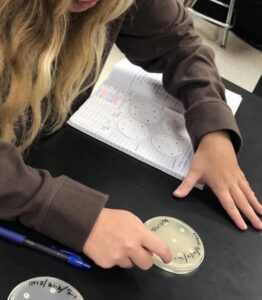
Megan Jandy knows a thing or two about viruses. In addition to a bachelor and Master’s degree in science, she is a certified teacher in the fields of chemistry and biology. Jandy will return to her classroom this year for her sixth year, where she works in a biomedical science high school program. Her students study for years to pass a seven-hour long medical industry exam and, if they pass, become certified biotechnician assistants. Such training helps nursing students, pre-medicine, pre-veterinarian, and many other types of college students attain life and career goals.
In Jandy’s classroom, approximately 110 students study viruses, epidemiology, public health, and related topics for six periods each year. Jandy has given of her own time after school and during a review boot camp on Saturdays for years. Routinely, her students study the importance of keeping lab stations and hands clean, how to disinfect their equipment, and all about how to lessen or eliminate contamination. When school starts back in August, she will be spending even more time than usual talking about contamination, disease spread, and the dangers of not using various protective equipment effectively.
In the past, Jandy has left daily cleanings to the school custodians, but with the spread of the coronavirus and the dangers that contracting it can bring, she feels compelled to take a more active role this year. “Hand sanitizer, masks, more Lysol, and seating further apart,” are techniques she will use to “lessen but not eliminate the,” spread of the coronavirus when an adult or one of her students bring it into the classroom.
Jandy has received no information about whether masks will be required for her students, but she will be reinforcing their importance for everyone’s safety, she says. The physical distancing strategy seems to concern her the most. Her work is, “collaborative, where students share supplies and lab equipment,” she says. This will be impossible while avoiding close, physical contact, she concedes. Her classroom lab is usually set up for collaboration which is an essential skill that many colleges and medical jobs require in medical labs. This year, physically close collaboration will be more of a theory than a practice due to the dangers such close contact might bring.
Jandy is also familiar with temperature scans, but notes that many carriers of the coronavirus can be asymptomatic. While all of her students are expected to have their temperature taken daily as they arrive on campus, she notes that their lack of a fever does not indicate they are not infectious with the coronavirus. She is also not sure where the additional sanitizer, masks, Lysol, and other products will be coming from. One thing seems certain in Jandy’s view-the new school year will bring with it many challenges her very bright students will need to address from day one.
This article is one in a series of articles about school employees and public health.



Very misleading headline as this article provides zero evidence that coronavirus will be harmful to or threaten the safety of these students or the teachers.
Floridians aged 64 and younger (students and teachers) have a 99.7% survivability of coronavirus related infection.
Source: Floridahealthcovid19.gov